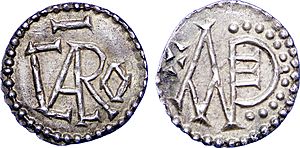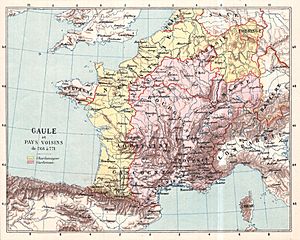Carloman I facts for kids
Quick facts for kids Carloman I |
|
|---|---|

A denarius minted by Carloman I
|
|
| King of the Franks | |
| Reign | 9 October 768 – 4 December 771 |
| Predecessor | Pepin the Short |
| Successor | Charles I |
| Born | 28 June 751 |
| Died | 4 December 771 (aged 20) |
| Spouse | Gerberga |
| Issue | Pepin |
| House | Carolingian dynasty |
| Father | Pepin the Short |
| Mother | Bertrada of Laon |
Carloman I (born June 28, 751 – died December 4, 771) was a king of the Franks. He ruled from 768 until his death in 771. Carloman was the second son of Pepin the Short and Bertrada of Laon. He was the younger brother of Charlemagne, who later became a very famous emperor. Carloman's death allowed Charlemagne to take control of the entire Frankish kingdom. This helped Charlemagne start his expansion into other lands.
Contents
Sharing the Frankish Kingdom
When Carloman was just three years old, he and his older brother Charlemagne were made King of the Franks. This happened alongside their father, Pepin the Short. They were also given the title "Patrician of the Romans." This special ceremony was performed by Pope Stephen II. The Pope had traveled from Rome to ask the Frankish King for help against the Lombards.
After their father Pepin died, Carloman and Charlemagne each inherited half of the Frankish Kingdom. Carloman's part was in the middle of the kingdom. Its capital city was Soissons. His lands included areas like the Parisian basin, Burgundy, and Alsace. These regions were not very connected to each other. They were also surrounded by the lands that Charlemagne received. Carloman's territories were easier to defend, but they brought in less money.
Many historians believe that Carloman and Charlemagne did not get along well. The exact reasons are not fully clear. Some think each brother felt he should be the only ruler. Charlemagne was the older son. However, some stories suggest Charlemagne might have been born before his parents were married. This idea is not always accepted. Their father Pepin's decision to split the kingdom seemed to make their bad relationship worse. It forced them to work together, but both felt they had been treated unfairly.
Rivalry with Charlemagne
Carloman's time as king was short and full of problems. The brothers both owned parts of Aquitaine. This region started a rebellion after Pepin the Short died. Charlemagne went to stop the revolt. Carloman also led his army to help. But the two brothers had a disagreement near Poitiers. Carloman then pulled his army away. Some historians think this was an attempt to weaken Charlemagne's power. The rebellion was a threat to Charlemagne's rule.
Charlemagne crushed the rebels on his own. Carloman's actions made him look bad among the Franks. Their relationship got even worse after this. Their mother, Bertrada, had to step in to help. She seemed to favor Charlemagne. She lived with him after her husband died.
However, some historians, like Rosamond McKitterick, have a different idea. They argue that we cannot judge the brothers' relationship based on just a few events. There is no strong proof of lasting bad feelings between them. McKitterick also points out that Charlemagne was very smart politically. It would have been good for both brothers to work together. This would help them keep their family's control over the Franks. Their family had only recently become kings. She also believes that Bertrada did not necessarily favor one son. She points to a meeting between Bertrada and Carloman in 770.
In 770, their mother Bertrada started a series of diplomatic moves. These were meant to surround Carloman with Charlemagne's allies. Charlemagne had married Desiderata. She was the daughter of the Lombard king Desiderius in Italy. This marriage created an alliance between Charlemagne and the Lombards. Bertrada also made sure Charlemagne became friends with Tassilo, Duke of Bavaria. Tassilo was her husband's nephew. She even tried to get the Pope to support the marriage. She arranged for Desiderius to give some lands to Rome. The Pope claimed these lands.
Pope Stephen III did not like the idea of an alliance between the Franks and the Lombards. But he was also worried about the Lombards. He also saw a chance to get rid of a powerful figure at the Papal court. This person was Christopher the Primicerius, who was against the Lombards.
These actions were good for the Franks in general. But they created serious problems for Carloman. He was left without any allies. He tried to use his brother's alliance with the Lombards to his own benefit in Rome. He offered his support to Pope Stephen III against the Lombards. He also started secret talks with Christopher, who felt isolated by the Frankish-Lombard friendship. But after Christopher was killed by Desiderius, Pope Stephen III supported the Lombards and Charlemagne.
Carloman's situation improved suddenly. Charlemagne unexpectedly sent his Lombard wife, Desiderius's daughter, away. Desiderius was very angry and embarrassed. He then seemed to form an alliance with Carloman. This alliance was against Charlemagne and the Pope. The Pope then decided to declare himself against the Lombards.
Death and What Happened Next
Carloman died on December 4, 771. He passed away at the Villa of Samoussy. His death was sudden. It was said to be from natural causes. Some stories claim he died from a severe nosebleed. At the time of his death, he and Charlemagne were very close to starting a war. Charlemagne's writer, Einhard, blamed Carloman's advisors for this. Carloman was first buried in Reims. Later, in the 13th century, his body was moved to the Basilica of Saint-Denis.
Carloman married a Frankish woman named Gerberga. According to Pope Stephen III, their father Pepin the Short chose her for Carloman. Carloman and Gerberga had two sons. The older son was named Pepin, after his grandfather. This meant he was expected to be Carloman's heir.
After Carloman's death, Gerberga expected her older son to become king. She thought she would rule as his regent, or guardian. However, Carloman's former supporters turned against her. These included his cousin Adalhard and Abbot Fulrad. They invited Charlemagne to take over Carloman's lands. Charlemagne quickly did so.
Gerberga then fled with her sons and a loyal noble named Count Autchar. They went to the court of King Desiderius. Desiderius then demanded that the new Pope Hadrian I crown Carloman's sons as Kings of the Franks. Gerberga's escape eventually led to Charlemagne destroying the Kingdom of the Lombards. Charlemagne saw Desiderius's support for Carloman's children as a threat to his own power. So, he invaded Italy and conquered it. Desiderius and his family were captured. They were forced into religious life. What happened to Gerberga and her children is not known. It is possible Charlemagne also sent them to monasteries.
Even though they had a difficult relationship, Charlemagne later named his second son "Carloman." This was after his deceased brother. This might have been a public way to honor his brother's memory. It also might have been to stop any rumors about how Charlemagne treated his nephews. But this changed in 781. Charlemagne had his son renamed Pepin.
Family
Carloman had several children with Gerberga:
- Pepin (born before 769)
- An unknown son (born around 770)
See also
 In Spanish: Carlomán I para niños
In Spanish: Carlomán I para niños
 | Delilah Pierce |
 | Gordon Parks |
 | Augusta Savage |
 | Charles Ethan Porter |


